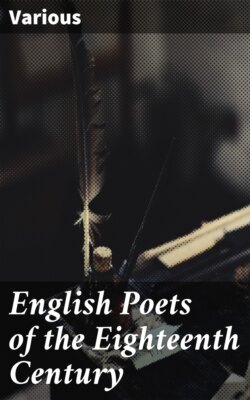Читать книгу English Poets of the Eighteenth Century - Various - Страница 40
На сайте Литреса книга снята с продажи.
FROM A HYMN TO THE PILLORY
ОглавлениеTable of Contents
Hail hieroglyphic state-machine,
Contrived to punish fancy in!
Men that are men in thee can feel no pain,
And all thy insignificants disdain.
Contempt, that false new word for shame,
Is, without crime, an empty name,
A shadow to amuse mankind,
But never frights the wise or well-fixed mind:
Virtue despises human scorn,
And scandals innocence adorn.
* * * * *
Sometimes, the air of scandal to maintain,
Villains look from thy lofty loops in vain;
But who can judge of crimes by punishment
Where parties rule and L[ord]s subservient?
Justice with, change of interest learns to bow,
And what was merit once is murder now:
Actions receive their tincture from the times,
And as they change, are virtues made or crimes.
Thou art the state-trap of the law,
But neither can keep knaves nor honest men in awe;
These are too hardened in offence,
And those upheld by innocence.
* * * * *
Thou art no shame to truth and honesty,
Nor is the character of such defaced by thee
Who suffer by oppressive injury.
Shame, like the exhalations of the sun,
Falls back where first the motion was begun;
And he who for no crime shall on thy brows appear
Bears less reproach than they who placed him there.
But if contempt is on thy face entailed,
Disgrace itself shall be ashamed;
Scandal shall blush that it has not prevailed
To blast the man it has defamed.
Let all that merit equal punishment
Stand there with him, and we are all content.
* * * * *
Thou bugbear of the law, stand up and speak,
Thy long misconstrued silence break;
Tell us who 'tis upon thy ridge stands there,
So full of fault and yet so void of fear;
And from the paper in his hat,
Let all mankind be told for what.
Tell them it was because he was too bold,
And told those truths which should not ha' been told,
Extol the justice of the land,
Who punish what they will not understand.
Tell them he stands exalted there
For speaking what we would not hear;
And yet he might have been secure
Had he said less or would he ha' said more.
Tell them that this is his reward
And worse is yet for him prepared,
Because his foolish virtue was so nice
As not to sell his friends, according to his friends' advice.
And thus he's an example made,
To make men of their honesty afraid,
That for the time to come they may
More willingly their friends betray;
Tell them the m[en] who placed him here
Are sc[anda]ls to the times;
But at a loss to find his guilt,
They can't commit his crimes.
